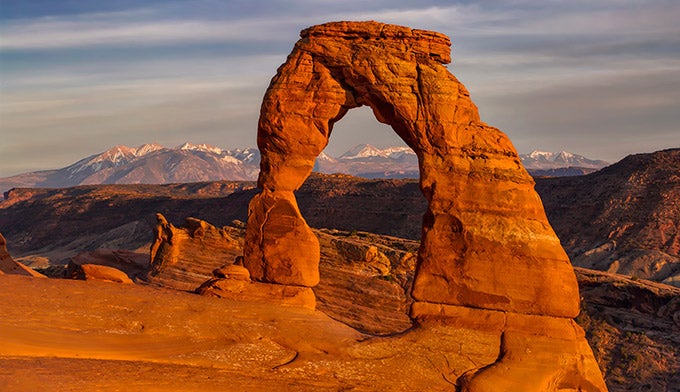Desert Solitaire: A Season in the Wilderness

'Delicate Arch in Arches National Park'
For three summers in the 1950s, Edward Abbey (1927-89) was a seasonal ranger at Arches National Monument, in southeastern Utah. That experience led to “Desert Solitaire: A Season in the Wilderness,” an extended essay of eloquence, anger, provocation and wit as dry as the slickrock country he loved.
Abbey evokes the stark beauty and grandeur of red-rock country, champions the cause of wilderness and howls like a banshee about the unrestrained commercialization of the outdoors by what he termed “industrial tourism.”
And this was decades before the explosive growth of motorized recreation, or monster traffic jams that clogged iconic national parks like Yellowstone, Yosemite, Grand Canyon and yes, Zion.
Abbey decried the tendency of tourists at Arches to never, ever leave the comfort of their cars, to hike out into the slickrock country and experience something wild, something primitive, something real and unmediated by commerce.
Long before there were controversies about snowmobiles in Yellowstone, Abbey asked the key question: what are the national parks for?
“The Park Service, established by Congress in 1916, was directed not only to administer the parks but also to ‘provide for the enjoyment of same in such manner and by such means as will leave them unimpaired for the enjoyment of future generations.’ This appropriately ambiguous language, employed long before the onslaught of the automobile, has been understood in various and often opposing ways ever since. The Park Service, like any other big organization, includes factions and factions. The Developers, the dominant faction, place their emphasis on the words ‘provide for the enjoyment.’ The Preservers, a minority but also strong, emphasize the words ‘leave them unimpaired.’ It is apparent then, that we cannot decide the question of development versus preservation by a simple referral to holy write or an attempt to guess the intention of the founding fathers; we must make up our own minds and decide for ourselves what the national parks should be and what purpose they should serve.”
— Edward Abbey, Desert Solitaire
There are other vignettes about his work as a seasonal ranger — a search and rescue mission, river-running, his view about cowboys, Indians and Mormons, an escape from quicksand, even the limited social thrill of escaping Arches for a few days, to the environs of Moab.
Abbey believed that modern man needed wilderness:
“A man could be a lover and defender of the wilderness without ever in his lifetime leaving the boundaries of asphalt, power lines, and right-angled surfaces. We need wilderness whether or not we ever set foot in it. We need a refuge even though we may never need to go there. I may never in my life get to Alaska, for example, but I am grateful that it’s there. We need the possibility of escape as surely as we need hope; without it the life of the cities would drive all men into crime or drugs or psychoanalysis.”
“Desert Solitaire” has been compared to Aldo Leopold’s “A Sand County Almanac” and even to Thoreau’s “Walden.” Indeed, writer Larry McMurtry referred to Abbey as the “Thoreau of the American West.”
And yet, Abbey was anything but a conventional, politically-correct environmentalist, with an abrasive “Keep America Beautiful — Burn a Billboard” style. Abbey advocated stringent immigration limits and was comfortable with guns, but he also had a towering contempt for welfare ranchers, energy companies, Chambers of Commerce and other despoilers of the West.
Abbey might have missed his calling as a writer for stand-up comedians. Look at this interchange with tourists:
“Are you married?
“Not seriously.”
“You must get awfully lonesome way out here.”
“No, I have good company.”
“Your wife?”
“No, myself.”
“Any dangerous animals out here, ranger?”
“Just tourists.”
Ironically, Abbey may be somewhat to blame for the crowds and traffic jams at the national parks and monuments in slickrock country. (To be fair, traffic jams in many parks have been replaced by shuttle buses, clean air and big parking lots.)
A lot of people have been bitten by the Abbey bug, drawn to red-rock country to be a respectful neighbor to the gopher snake living under the trailer, to admire cliff rose and cactus blossoms, to ponder the erosive power of the ages that produce soaring cliffs, arches, hoodoos and balanced rocks.
In closing, here’s Abbey’s Blessing:
“May your trails be crooked, winding, lonesome, dangerous, leading to the most amazing view. May your mountains rise into and above the clouds.”